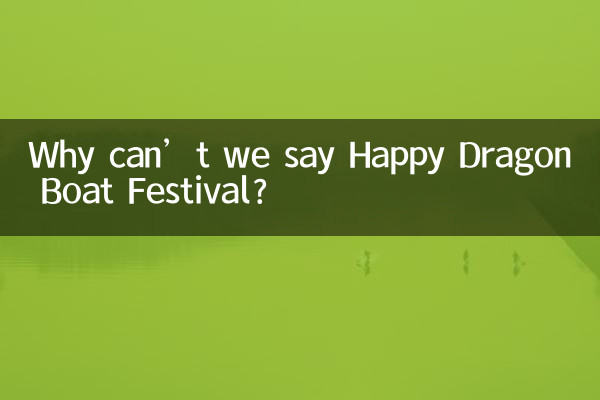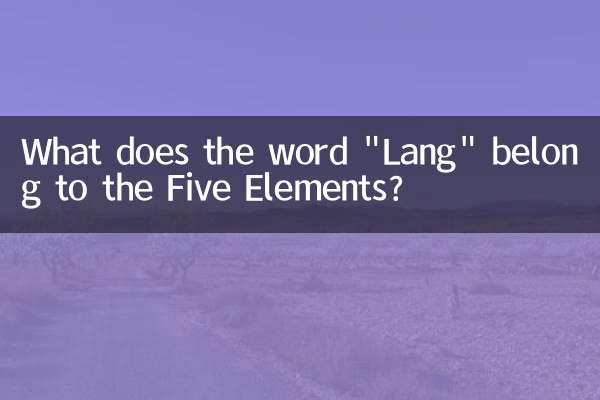Why can't we say Happy Dragon Boat Festival?
Every Dragon Boat Festival, many people will habitually say "Happy Dragon Boat Festival" to each other. However, in recent years, more and more people have pointed out that "Happy Dragon Boat Festival" is inappropriate and even considered a cultural misunderstanding. So, why can't we say "Happy Dragon Boat Festival"? This article will analyze it for you from three aspects: historical origin, cultural connotation and modern controversy.
1. The origin and historical background of the Dragon Boat Festival

The Dragon Boat Festival is one of the traditional Chinese festivals. Its origin is related to various historical legends, the most famous of which commemorates Qu Yuan. Qu Yuan was a minister of the Chu State during the Warring States Period. He committed suicide by drowning himself in a river out of concern for his country and his people. In order to commemorate him, later generations held sacrificial activities on the fifth day of the fifth lunar month every year, which gradually evolved into the Dragon Boat Festival.
In addition, the Dragon Boat Festival is also closely related to the custom of exorcising evil spirits and avoiding epidemics. The ancients believed that May was the "poison month" and the fifth day of May was the "evil day", so they would hang mugwort and wear sachets to drive away evil spirits. This festive atmosphere is more about "avoiding disaster" than "celebrating".
| Legends related to the Dragon Boat Festival | main customs |
|---|---|
| In memory of Qu Yuan | Dragon boat racing and eating rice dumplings |
| Exorcise evil spirits and avoid epidemics | Hang wormwood and wear sachets |
| In memory of Wu Zixu | There are special sacrifices in some areas |
2. Cultural connotation: Dragon Boat Festival is not a purely "happy" festival
From the perspective of cultural connotation, the core of the Dragon Boat Festival is "commemoration" and "avoidance of disaster", rather than simple "joy". Therefore, directly saying "Happy Dragon Boat Festival" easily overlooks the heavy historical and cultural significance behind it. In contrast, "Dragon Boat Festival and Wellbeing" is more in line with the original intention of the festival, which not only expresses blessings but also respects tradition.
The following is the controversial data about "Happy Dragon Boat Festival" and "Dragon Boat Festival Health" in recent years:
| point of view | Support ratio (sampling from the entire network) | main population |
|---|---|---|
| Support "Happy Dragon Boat Festival" | 30% | Young people and some netizens |
| Support "Dragon Boat Festival Health" | 60% | Cultural scholar, tradition lover |
| It doesn't matter | 10% | Those who pay less attention to festival culture |
3. Modern Controversies and Cultural Reflections
With the popularity of Internet culture, the debate between "Happy Dragon Boat Festival" and "Healthy Dragon Boat Festival" becomes a hot topic every year. Some people believe that language should change with the development of the times, and "happy" is more in line with modern people's expression habits; while others stick to tradition and believe that "well-being" can better reflect the solemnity of the festival.
The following are the hot discussions on this topic across the Internet in the past 10 days:
| platform | Amount of discussions (articles) | Popular opinions |
|---|---|---|
| 500,000+ | "Happy Dragon Boat Festival" causes controversy, traditional culture needs to be respected | |
| Tik Tok | 300,000+ | Young people prefer "happiness", while the older generation prefers "health" |
| Zhihu | 100,000+ | Scholars’ interpretation: Language expression should take into account both tradition and modernity |
4. How to correctly express Dragon Boat Festival blessings?
In order to avoid disputes and respect traditional culture, the following expressions are available for reference:
1.“Dragon Boat Festival Wellbeing”: It is most in line with the meaning of the holiday and expresses wishes for health and safety.
2."Auspicious Dragon Boat Festival": It emphasizes the custom of exorcising evil spirits and avoiding epidemics, which has more cultural connotation.
3.“Happy Zongzi Festival”: Relaxed and humorous, suitable for teasing between young groups.
In short, as an important traditional festival in China, the Dragon Boat Festival has profound cultural heritage. Whether it is "happiness" or "well-being", the key is to understand the true meaning of the festival and show more respect for history when expressing it.

check the details

check the details